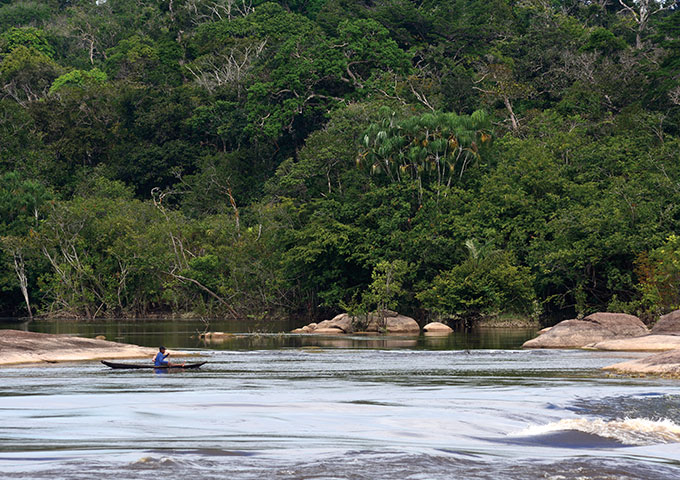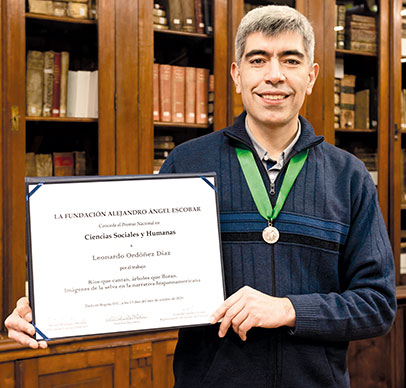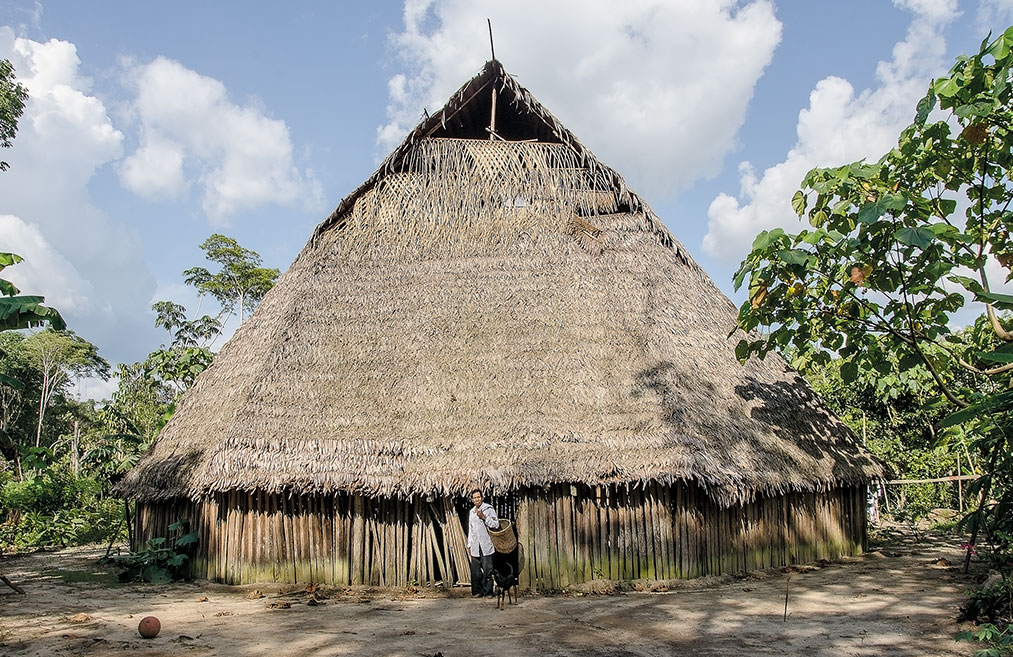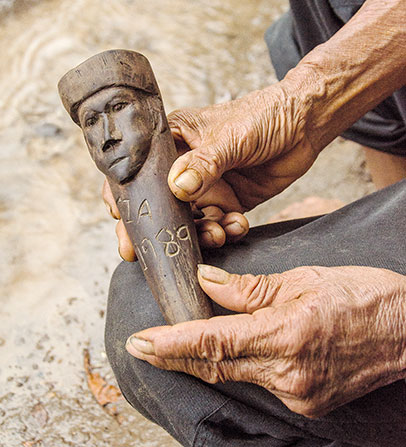The key to save the forest lies in literature
By: Ninfa Esperanza Sandoval Rojas
Photos:
Environment

By: Ninfa Esperanza Sandoval Rojas
Photos:
The novel La vorágine (The Vortex) by José Eustasio Rivera did not narrate the romantic story of Arturo and Alicia, whose happiness would never happen neither La Casa Verde (The Green House) by Mario Vargas Llosa, which shows three intertwined love stories. These iconic works of Latin-American literature planted the seed in their reader’s imagination about forests as inhospitable places, propitious for barbarity, injustice, and depredation. After almost a decade of analyzing and studying narrative texts that cover more than a century of the history of Hispano–American literature, professor, philosopher, and researcher Leonardo Ordóñez Díaz brought to light the stereotypes showing contempt of idealizing the forest and its original inhabitants from the remote times of the conquest .
This exercise, which began as a contribution to the protection of tropical forests, revealed the way in which those environments and their inhabi - tants are shown, boosting and allowing the deforestation and deterioration processes of rainforests in the continent .
The detailed and rigorous documentation on the onset and subsequent spread of the damaging exploitation practices, which got biodiversity and the culture of tropical forests on the brink of collapse throughout the region, enabled professor Ordóñez to obtain the most precious scientific in Colombia: the National Prize of Social and Human Sciences Alejandro Ángel Escobar, 2020.
According to the jury of the competition, the winning work was Singing rivers, crying trees. Images of the forest in the Hispano–American narrative “can be read by multiple people from multiple disciplinary perspectives. Additionally, it tran - scends the Colombia’s reality and encompasses the whole Latin-American region."
Professor Ordóñez, director of the program of philosophy at the School of Human Sciences, Universidad del Rosario, explains, “there isn’t one forest, but many forests.” For this reason, he included texts set in the rain forests of many countries in South and Central America in his analysis. He based this work on recent tools and developments in environmental philosophy, biogeography, ecological history, and cultural anthropology, among other disciplines, thereby opening a fruitful dialog between literary criticism and other areas of knowledge.
The approach on diversity, resources, and the culture of rainforests is nonuniform in all the countries of the region and, therefore, a large variety of collective views is present there. Ordoñez’s research classifies them and also shows how these collective views have had an influence on our relationship with the woods, thus legitimizing the aggressive forms of colonization and exploitation.
“For some people, a forest is a hostile and unhealthy place. For others, it is a backward and marginalized place, which needs to be civilized. And for others, it is a pure and virginal space that must be zealously protected and must stay away from human intervention. These representations have lived with us for centuries. Their legacy has fostered an alarming shrinkage of biodiversity, pushing the original inhabitants to the brink of disappearance,” he states.

"It is necessary to recognize that forests, including their flora and fauna populations, are not mere resources but complex entities that are highly valuable. We must also accept that the native communities are not remnants from the past but have to be deemed as valid intermediaries deserving consideration and respect given the complexity that supports their lifestyles and relationship with the jungle,” as explains the director of the Philosophy Program of the School of Human Sciences.
A new way of narrating it
Given the serious consequences of decreasing forest cover, professor Ordóñez advocates for an immediate change on how to see and narrate forests. “It is necessary to recognize that the forests and their animal and plant populations are not mere resources but complex and valuable entities.
We must also accept that the native communities are not remnants from the past, but they have to be deemed as valid intermediaries deserving consideration and respect given the complexity that supports their lifestyles and relationship with the forests,” he explains.
To achieve that new narrative, he offers the case of the perception of nature that native men and women have. It is the case of the Amazonian shamans, wise men, and kurakas, who possess deep knowledge on vegetation. In general, the researcher states that the inhabitants of these lands, whose way of living cannot be understood if it is not linked to Mother Earth, give clues on the type of human–nature relationship that humanity needs to consolidate and how to put it into practice. A relationship that goes from exploitation and extraction to symbiosis and mutual benefit.
Ordóñez considers that the history of Amazonia is rich in lessons in that sense. Its dwellers have reshaped and accompanied the forest, have coexisted with it, and, sometimes, have affected it. Thus, the knowledge of these experiences provide is fundamental for human beings. A corpus of knowledge is endangered and is about to get lost.
“If we want to overcome the current ecological crisis, we must leave behind the idea that nature and culture are separate entities. It is necessary to reconsider the fact that the historical and technological advancement of mankind has forgotten the connections with the biosphere ecosystems,” professor Ordóñez underlines. Further, he insists: “public opinion needs to be educated about the impact of their activities on the environment to understand the role of the forest ecosystem in the preservation of a setting that is favorable for human kind.”
Contributions highlighted by the Prize
The jury identified the disciplinary contributions of the research:
• Examines the unequal economic and ecological relations behind the deterioration of tropical forests.
• Promotes and helps guiding the protection of tropical forests as part of the essential effort to solve the ecological problems we undergo today.
• Highlights the need for «ecological literacy» of public opinion regarding the interaction dynamics between human activities and the environmental settings.
• Enriches the history of ideas in Latin-America through the study of narratives about the forest
Source: Alejandro Ángel Escobar Foundation

"This land is made of beauties that have never been told or wrongly told, which is worse than silencing them.” César Calvo, Las tres mitades de Ino Moxo
For more than ten years, Universidad del Rosario has increasingly emphasized emphasis on social impact researches, which allow a better understanding of the national context and its problems. Professor Leonardo Ordóez Daz's research in ecology that was recognized by the Alejandro Angel Escobar Foundation demonstrates this.
“The prize is an indicator that such research policy is going in the right direction, and it is convenient to keep believing in it, just like the works that may delve into the ecological issues we face today. Looking forward, it is crucial to keep on investigating who we have been in the past and who we are today, so that we can build the country we want to be in a conscious, systematic, and guided way,” the professor claims.
“Personally speaking, this job is a contribution from the human and social sciences to protect the tropical forests. It is a critic of the modernizing and developing projects promoted by government policies that separate nature from culture, and it is a call for an urgent need for developing effective protection policies regarding the overexploitation of the forests, deforestation, extensive cattle-raising, and making the local population and knowledge invisible.
This recognition is a sign that the problem I addressed is causing a louder echo in the academic community and little by little, it is drawing the attention required in the agenda of public interest issues, which are a priority for the future of Colombia and other countries in the region”, he concludes.
The research Singing rivers, crying trees. Images of the forest in the Hispano-American narrative follows a chronological order from the novels published in the era of conquest up to the current literary books dedicated to the forest and shows some unexpected but very relevant theme guidelines related to the situation of ecological problems existing today, for example:
• The role of feminism in the defense of ecosystems.
• The moral status of nonhuman entities (particularly animals and plants) and their possibility of being recognized Subjects of law.
• The relationship of modern Western societies with aboriginal peoples and their tendency to regard them as archaic remnants of a bygone era that must be overcome.
• The negative effects of the conflict between civilization and barbarism.
• The marvelous or magical character of American nature.
• The debates on social mixing and hybridization in our societies.

According to the jury of the competition, the winning work was Singing rivers, crying trees. Images of the forest in the Hispano– American narrative “can be read by various people from multiple disciplinary perspectives. Additionally, it transcends the Colombia’s reality and encompasses the whole LatinAmerican region.”